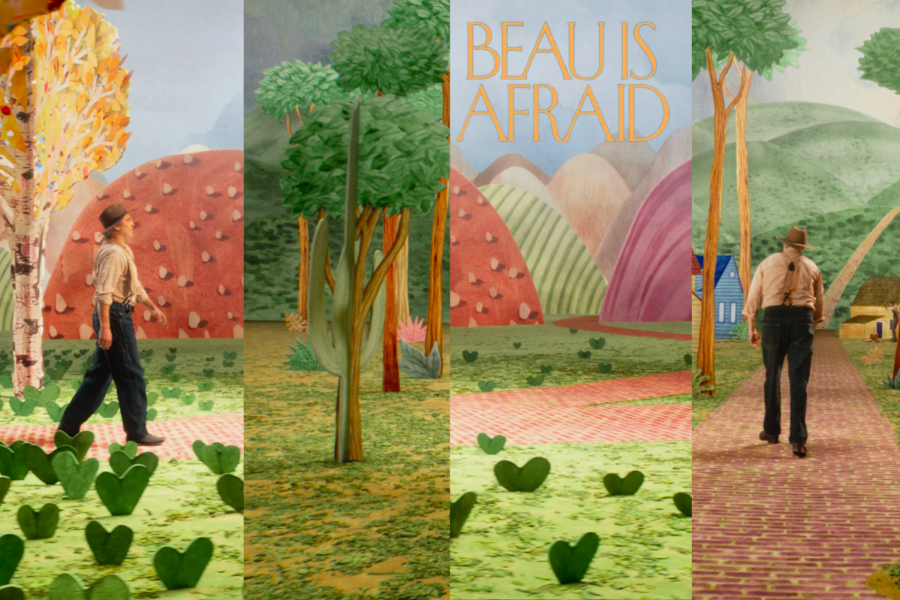Reel Thoughts: Everyone in ‘Beau Is Afraid’ needs to go to therapy
Ari Aster’s new film “Beau Is Afraid” has grossed approximately $8 million at the box office as of May 15, despite having a budget of $35 million.
May 14, 2023
Warning: This article contains spoilers.
From the mind of Ari Aster, the director behind “Midsommar” and “Hereditary,” comes the everything-but-the-kitchen-sink film “Beau Is Afraid,” starring Academy Award winner Joaquin Phoenix.
The picture’s three-hour runtime is packed with gorgeous cinematography, but the viewing experience was mostly uncomfortable and somewhat distressing. Though it addresses heavy topics like toxic relationships and depression following a parent’s passing, the storytelling lacks clarity and leaves the viewer grasping at straws to understand the film’s meaning.
The A24 film begins with the birth of Beau Wasserman (Phoenix) but quickly flashes forward to a middle-aged version of the character living in a comically chaotic city environment riddled with poverty — which Beau is drastically afraid of. He is also prescribed pills that only exacerbate his extreme general anxiety.
After the keys to Beau’s apartment are stolen and he learns his mother Mona (Patti LuPone) has passed away, the mindf–k of the film truly begins. The plot’s departure from Beau’s chaotic urban life leaves behind many loose strings, yielding a disorienting and uncertain path forward for the film. This choice is likely meant to mimic Beau’s own vulnerability and naivety, but ultimately leaves viewers confused.
Upon being hit by a car at the end of the film’s first act, Beau wakes up in the home of an unsettling and controlling “Get Out”-reminiscent family who tries to nurse him back to health.
However, the family only worsens Beau’s confusion, breaking him down and taking the viewer down with him as his reality becomes muddled. Beau winds up fleeing by dashing into a forest where he watches a traveling theatre company’s performance, which seems like a prophetic look into his own life story as the play tracks a man’s search for his family.
This scene yields some of the film’s more visually memorable and impressive shots, as Beau walks through what appears to be a pop-up storybook in a daydream sparked by the company’s play. The stop-motion and mixed-media elements of the scene mirror the childlike wonder of seeing Beau’s life reimagined for the play, mixing fiction with his own lived experience.
Beau’s journey concludes when he returns to his mother’s home only to learn she had staged her death. By this point of the movie, the line between actual reality and Beau’s perception of it has become irrevocably blurred. The audience’s trust has been broken, which makes it difficult to hold stake in the storyline for fear that it will continue to betray their expectations.
The film’s revelations do not end, however, with Beau’s visit to his mother’s home. Viewers continue to learn about the main protagonists’ psyche up until the film’s conclusion.
Beau is often infantilized and defers to the desires of female characters, generating plenty of internet commentary on his “mommy issues.” Therefore, it is unsurprising to learn Beau’s mother’s abusive tendencies likely contributed to Beau’s entrapment in the disoriented state of mind we find him in. By the end of the film, it is clear the story is told through Beau’s eyes and harnesses his dynamic mind to tell a story of a dysfunctional mother-son relationship.
Due to the sheer length of the film and its volume of themes and ideas, you could make a multitude of arguments regarding what the film is actually trying to say. Regardless, it fails to say anything to a great depth or extent.
Though Phoenix gives an emotional and commanding performance, it felt like Aster was trying to reach a word count by throwing ideas at a wall and hoping some would stick in the viewer’s mind. In the end, the movie falls a bit flat, with concluding scenes proving surprising but anticlimactic.
Despite this critique, the journey “Beau Is Afraid” takes viewers on is joyous fun, and the visual storytelling shows mastery and creativity in new ways. From eerily painted masks to engaging point-of-view shots, the vibrancy of the film truly finds foundation in the optics — and sometimes optical illusions — it creates.
Email: [email protected]
Email: [email protected]
Related Stories:
— CineYouth features Northwestern filmmakers, highlights youth talent from across the globe
— Reel Thoughts: ‘The Super Mario Bros. Movie’ shoots for the stars, avoids a red shell


